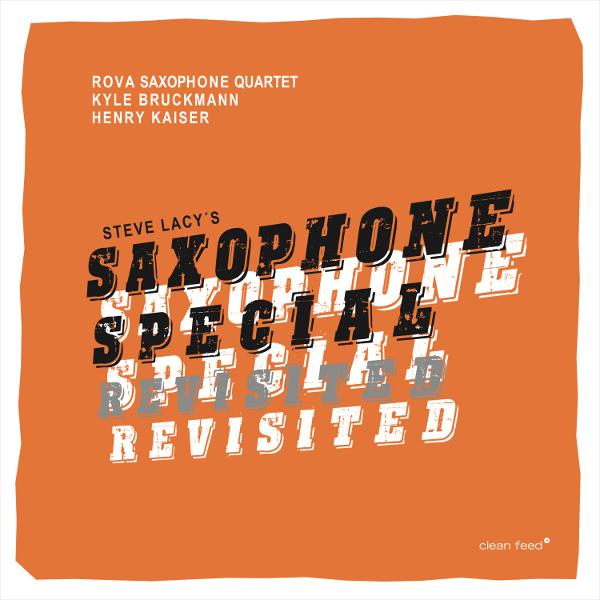

Saxophone Special Revisited
Steve Lacy's mid-1970s innovations helped shape improvised music for decades. His 1974 live recording "Saxophone Special" lit up the ears of the soon-to-be Rovas and sparked our imaginations during the band's earliest days. This CD says thanks and pays tribute to one of the band's mentors and greatest inspirations. The first 5 tracks are Rova's arrangements of the five tracks on the original album. The two extra tracks penned by Lacy are added to this CD, also arranged by Rova members. The entire CD features special guests Henry Kaiser on guitars and Kyle Bruckmann on synths.
Liner Notes for this package by B. Morton:
"Rova and friends – Saxophone Special"
The great chemist and activist Linus Pauling, the only man ever to win two unshared Nobel Prizes, liked to say that in his work he did not so much stand on the shoulders of giants (which was how Sir Isaac Newton characterised scientific progress) as march arm-in-arm with colleagues and friends. It's a salutary comment for every branch of human endeavour and it has some bearing on the music you are holding. ROVA is not a repertory band. Its nearly 40 year history has seen some of the finest new writing in the jazz idiom of the modern era. But for all its dedication to the different compositional drives of its membership, ROVA has, in recent years, occasionally chosen to stand on the shoulders of giants. Perhaps the best known example, before now, was the group's extraordinary realisation of John Coltrane's Ascension, a much-admired record but, one might say, a somewhat underrated composition. The group’s many performances of the piece have been beacon moments in recent jazz, often drawing in collaborators from other areas of music.
Here is another example, a new realisation of Steve Lacy's 1975 recording Saxophone Special, which saw Lacy and his musical partner Steve Potts working alongside British saxophonists Evan Parker and Trevor Watts, with a guitar part from Derek Bailey, and idiosyncratic synthesizer sounds from Michael Waisvisz. The obvious attraction of such a work to a saxophone quartet open to association with others doesn't in any way blunt the boldness of ROVA's decision to recreate the work in its own distinctive idiom. This isn't a karaoke project. It is a fresh return to music of still undervalued harmonic and gestural complexity.
In an interview made for the BBC, but only broadcast in part, Lacy told me that his music at the time of Saxophone Special was "pretty much all in seconds, these supposedly no-good intervals which you're supposed to avoid, but I found that if you placed them right and held your nerve, you got amazing results . . . chiming sounds, really beautiful". The December 19 1974 Wigmore Hall concert was my Christmas present to myself that year. That and a Dutch exchange student called Hanne. Unfortunately she wasn't keen on seconds.
The music made that day is illustrative of an issue that dogs improvised music unseen. A performance made in the moment, recorded or not, can be seen as a creative icon: entire, perfect, self-defining, unique. When such a performance is recorded, as it was for the Emanem label, then posterity has a record of it. The record in this case has some limitations. Derek Bailey's work with stereo guitar is not conveyed by a mono recording. John Stevens' drum sounds and some of Kent Carter's quieter bass work are rather lost. What is more often forgotten, or overlooked, is that every experiment in music, even those that seem self-contained and assured, open up a network of possibilities, most of which go unexplored. Apart from the most generic brands of swing or bebop, almost every recording ever made opens up the possibility of exploration in the idiolect of that group at that moment. Even at a time when repertory recreation is a defining aspect of our culture – whether it's a frame-by-frame remake of Psycho or a hard-to-tell revoicing of Kind of Blue by Mostly Other People Do The Killing – it is rare for a present-day group to so comprehensively rethink a past work as ROVA has done with Ascension or here, with the assistance of guitarist Henry Kaiser and synthesiser mage Kyle Bruckmann.
Lawrence Ochs says of Saxophone Special that it "lit up the ears of the soon-to-be ROVAs". It is, then, one of those recordings that is perhaps best thought of not as a finished work of art but as a draft score, too challenging for execution in its moment, buy lying in wait for a future generation and a further evolution of style and thinking. So this new version is a homage both to a great saxophonist and composer of the past – and a rapidly receding past, where does the time go? – but also to ROVA's own history and friendships. The pieces on Saxophone Special are heard through the filter of four further decades of shared experience, an arm-in-arm progress through some of the most challenging territory in contemporary culture. It is a tribute album and a tribute to a quiet giant of our music, but it is also a celebration of a common destiny, and as Pauling said, that is the grander endeavour.
—B. Morton
Credits:
Bruce Ackley: soprano sax
Steve Adams: alto and sopranino sax
Larry Ochs: tenor and sopranino sax
Jon Raskin: baritone, alto, sopranino sax
Kyle Bruckmann: analog synthesizers
Henry Kaiser: guitar
1. Staples (9:33)
2. Swishes (5:54)
3. Sops (5:40)
4. Snaps (6:50)
5. Dreams (13:15)
bonus tracks:
6. Clichés (7:30)
7. Sidelines (10:57)
all compositions by Steve Lacy / SACEM
Recorded Sept 19, 2015 at Fantasy Studios in Berkeley
production: Henry Kaiser
engineering: Jesse Nichols
photo: Brandy Gale
thanks to: Toshihiko Tanabe, Chris Muir, Evan Parker Trevor Watts, Steve Potts,
Michel Waisvisz, Derek Bailey , Emanem and especially Steve Lacy..
Rova plays Micheal Waisvisz’ crackleboxes on Sidelines.